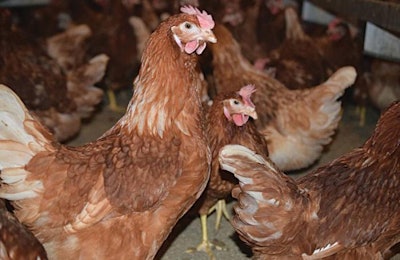
Gemperle Farms will shift all of its egg production to either organic or cage free over the next eight years. Steve Gemperle, president, Gemperle Farms, said the nation’s 21st largest egg producer is making this conversion in response to increased consumer demand for cage-free eggs.
"We have always appreciated consumers that support the cage-free and organic movements through their purchasing choices both at grocery stores and in restaurants," Gemperle said. "The trend we now see is that more grocers, restaurants and food manufacturers are catching on to these consumer choices. This shift will allow us to move towards a 100 percent organic and cage-free future for Gemperle Family Farms."
All cage free by 2024
When asked about the timetable for conversion to 100 percent cage-free egg production, Gemperle said, “If consumer trends continue in the current direction towards cage-free and organic (eggs), we expect to be fully converted before 2024. Over 50 percent of our barns have already been converted to cage free and organic.”
Gemperle Farms’ conversion to cage-free egg production is being accomplished with a combination of remodeling existing buildings and building new ones. When asked if he expected hen numbers to increase in the future, Gemperle said, “We believe our hen numbers will grow with customer demand. California's population has grown dramatically over the years.”
Gemperle said that the company employs open aviary and floor systems for housing its cage-free hens. He said they are not trying to open up or modify any cage systems to be used as aviaries.
“We currently have been building open aviaries and believe they are the right choice,” he said. “We are using all new aviary equipment. We have found over our decades of experience that it is the best environment for our birds.”
The future for cage-free eggs
Gemperle was asked if he thought California consumers will be satisfied with cage-free eggs from hens in aviary-type systems as the standard egg or whether the market for eggs from birds with outdoor access will continue to grow and challenge “regular” cage-free eggs for what is “standard” in the future.
“Consumers have all different buying habits and desires," he said. "How this changes is very difficult to predict. We believe that there will always be different categories of eggs that meet different consumer needs. Our business philosophy has always been to supply consumers the healthiest and most nutritious local egg choices using the highest animal welfare standards. We are committed to producing the eggs in aviaries and floor houses.”
Gemperle Farms has been producing cage-free and organic eggs as part of its product mix for more than two decades. The company is based in Stanislaus County, California, which is east of San Jose in the Central Valley. As of January 1, 2015, cage-housed hens producing eggs for the California market have been required to be given a minimum of 116 square inches of cage floor space. Converting to cage-free egg production for the California market results in a lesser reduction in hen numbers within a building than would be the case for a farm producing a the UEP Certified cage density of 67 square inches per hen.


















